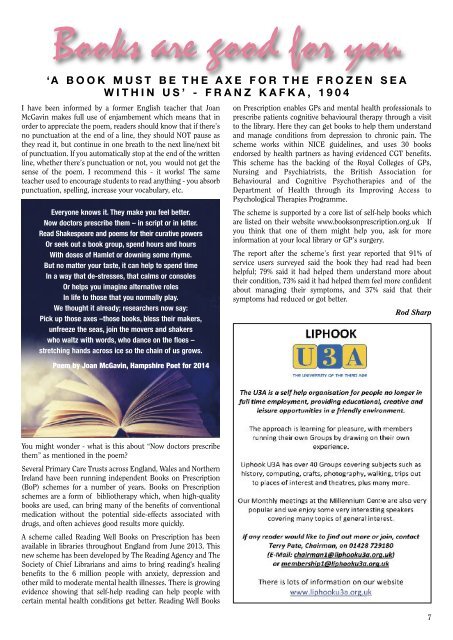Liphook Community Magazine - Spring 2015
Liphook Community Magazine - Spring 2015
Liphook Community Magazine - Spring 2015
Create successful ePaper yourself
Turn your PDF publications into a flip-book with our unique Google optimized e-Paper software.
Books are good for you<br />
‘A B O O K M U S T B E T H E A X E F O R T H E F R O Z E N S E A<br />
W I T H I N U S ’ - F R A N Z K A F K A , 1 9 0 4<br />
I have been informed by a former English teacher that Joan<br />
McGavin makes full use of enjambement which means that in<br />
order to appreciate the poem, readers should know that if there’s<br />
no punctuation at the end of a line, they should NOT pause as<br />
they read it, but continue in one breath to the next line/next bit<br />
of punctuation. If you automatically stop at the end of the written<br />
line, whether there’s punctuation or not, you would not get the<br />
sense of the poem. I recommend this - it works! The same<br />
teacher used to encourage students to read anything - you absorb<br />
punctuation, spelling, increase your vocabulary, etc.<br />
Everyone knows it. They make you feel better.<br />
Now doctors prescribe them – in script or in letter.<br />
Read Shakespeare and poems for their curative powers<br />
Or seek out a book group, spend hours and hours<br />
With doses of Hamlet or downing some rhyme.<br />
But no matter your taste, it can help to spend time<br />
In a way that de-stresses, that calms or consoles<br />
Or helps you imagine alternative roles<br />
In life to those that you normally play.<br />
We thought it already; researchers now say:<br />
Pick up those axes –those books, bless their makers,<br />
unfreeze the seas, join the movers and shakers<br />
who waltz with words, who dance on the floes –<br />
stretching hands across ice so the chain of us grows.<br />
Poem by Joan McGavin, Hampshire Poet for 2014<br />
on Prescription enables GPs and mental health professionals to<br />
prescribe patients cognitive behavioural therapy through a visit<br />
to the library. Here they can get books to help them understand<br />
and manage conditions from depression to chronic pain. The<br />
scheme works within NICE guidelines, and uses 30 books<br />
endorsed by health partners as having evidenced CGT benefits.<br />
This scheme has the backing of the Royal Colleges of GPs,<br />
Nursing and Psychiatrists, the British Association for<br />
Behavioural and Cognitive Psychotherapies and of the<br />
Department of Health through its Improving Access to<br />
Psychological Therapies Programme.<br />
The scheme is supported by a core list of self-help books which<br />
are listed on their website www.booksonprescription.org.uk If<br />
you think that one of them might help you, ask for more<br />
information at your local library or GP’s surgery.<br />
The report after the scheme’s first year reported that 91% of<br />
service users surveyed said the book they had read had been<br />
helpful; 79% said it had helped them understand more about<br />
their condition, 73% said it had helped them feel more confident<br />
about managing their symptoms, and 37% said that their<br />
symptoms had reduced or got better.<br />
Rod Sharp<br />
You might wonder - what is this about “Now doctors prescribe<br />
them” as mentioned in the poem?<br />
Several Primary Care Trusts across England, Wales and Northern<br />
Ireland have been running independent Books on Prescription<br />
(BoP) schemes for a number of years. Books on Prescription<br />
schemes are a form of bibliotherapy which, when high-quality<br />
books are used, can bring many of the benefits of conventional<br />
medication without the potential side-effects associated with<br />
drugs, and often achieves good results more quickly.<br />
A scheme called Reading Well Books on Prescription has been<br />
available in libraries throughout England from June 2013. This<br />
new scheme has been developed by The Reading Agency and The<br />
Society of Chief Librarians and aims to bring reading's healing<br />
benefits to the 6 million people with anxiety, depression and<br />
other mild to moderate mental health illnesses. There is growing<br />
evidence showing that self-help reading can help people with<br />
certain mental health conditions get better. Reading Well Books<br />
7

















